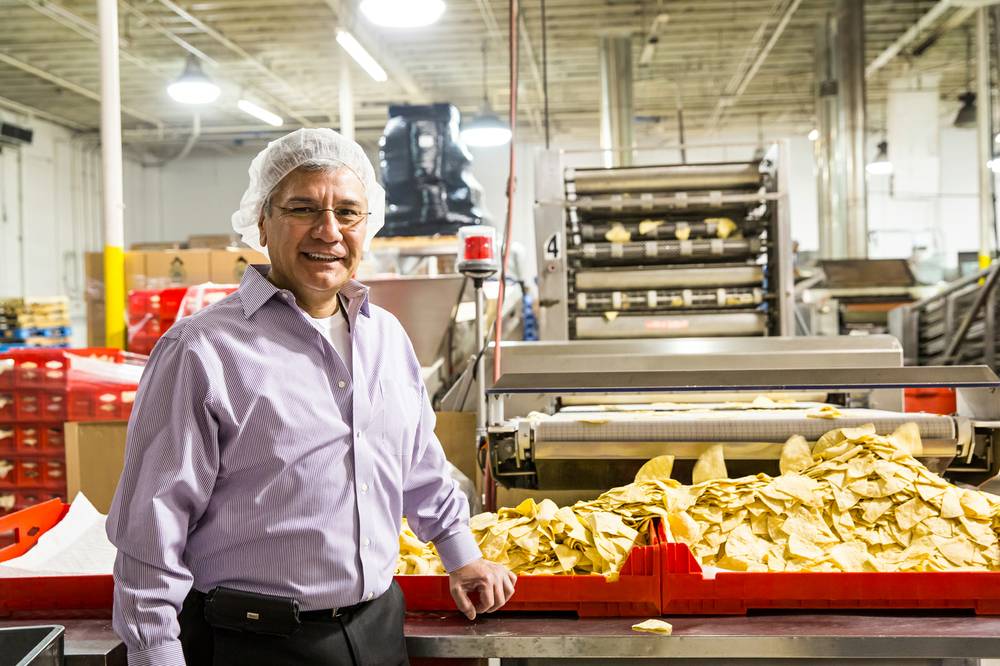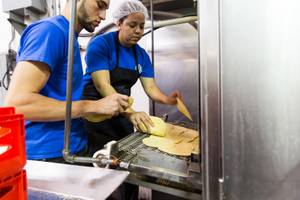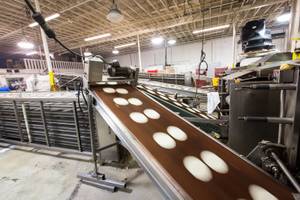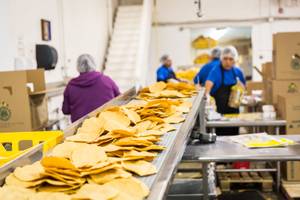Every New Year’s Eve, Jose Gutierrez would duck out of his post at the Dunes showroom to find his son Gustavo, who worked the front desk. For a brief moment, they’d take a break from attending to the revelry of others and imagine a day when they could celebrate, too.
It was the early ’80s, and after founding Nevada’s first tortilla factory, the Gutierrez family was still working on the Strip as the business struggled to find its legs.
“Every year we said the same thing: ‘This year is going to be our year,’” Gustavo says.
It would be nearly a decade before the annual toast came true. The Gutierrez clan started Los Arcos Tortillas in 1979, naming it for the famous archway that greets visitors to the Mexican city of Guadalajara, where the family is from. They went through 200 pounds of corn per day and had to hunt down customers.
Now, the North Las Vegas factory churns through 20,000 pounds of corn every day. If you’ve eaten Mexican food in Las Vegas, you’ve probably had their tortillas or chips, which are the foundation for tacos and nachos in restaurants across the Valley and in Strip properties from Mandalay Bay to the Stratosphere.
“For the first 10 years I looked more like a grease monkey than an owner, because I was working on the equipment or making tortillas, making phone calls to sell the product and making delivery runs,” says Gustavo “Gus” Gutierrez, who runs the business now.
When it launched in a still-small Las Vegas Valley, Los Arcos was ahead of its time, the boom of interest in Mexican food and the influx of Hispanics into Southern Nevada both years away. It started with a single machine that pumped out tortillas one at a time. Still, with father, mother, son and daughter all working, they couldn’t keep pace. Tortillas piled up as they struggled to stack, count and bag. Not that it mattered much, because there were no customers.
“My mother said: ‘If the customers aren’t coming to us, we’re going to start going to them,’” Gus recalls. The family went door to door, knocking at apartment buildings in Hispanic neighborhoods. Jose and Gus kept working on the Strip to offset the money they were pouring into the factory, but growth was slow and profits nonexistent. At one point the bank foreclosed on their home and their cars were repossessed, because they couldn’t keep up with payments while providing life support for Los Arcos.
After buying a more modern machine, they landed an account with a Mexican restaurant at Meadows Mall. Business seemed to spark from there, more and more restaurants serving their chips and tortillas. Then, in the summer of 1984, Gus got a call in the middle of the night. The factory was on fire. The fire marshal said it was instantaneous combustion caused by excessive heat in the warehouse where hibiscus flowers were stored.
“I thought someone was playing a practical joke on me,” Gus says. “I get to the plant, and it’s gone. All of the equipment was burned out.” To make matters worse, the family lacked the proper insurance. “We needed to start over with no money,” Gus recalls.
That might have been the end of Los Arcos. But with the generosity of industry friends and their own extended family, the Gutierrez’s labor of love was reincarnated. A Southern California tortilla company gave them a whole industrial line (worth about $250,000) and told them to repay when they could. Friends and family came up with another $50,000.
By early 1985, they were up and running again, reincorporated as Tortillas Inc. but still selling under the Los Arcos brand. Gus took over plant operations full-time, quitting his casino job as the company finally became sustainable. His father opened a restaurant.
Nevada’s Hispanic community grew 131 percent during the 1980s, then tripled during the ’90s, going from 10 percent of the state’s population to 27 percent.
“The population boom and the boom in Mexican food really helped us out,” Gus says. “I mean, I hate to say it, but Taco Bell and stuff like that helped spread Mexican food.”
Mexican and Tex-Mex dining was taking off, and in 1989 the Tortilla Industry Association was formed. Gus joined, serving as a board member and later president, and used the opportunity to go on a reconnaissance mission. He visited tortilla factories across the country and learned on lines from coast to coast. With the advantage of having been in the community since 1979, Tortillas Inc. became Southern Nevada’s go-to Mexican food supplier, making chips and tortillas and distributing other Mexican products to stores, restaurants and Strip resorts.
The factory floor has become a whirring, stainless-steel maze of bins, conveyor belts, ovens and deep-fryers the size of Mini Coopers. Dozens of hair-net crowned workers tend the machines and package the products.
Corn kernels are cooked in a vat for six to eight hours in water treated with powdered lime, a leaching agent that helps peel the hull. Next the corn is transferred to a grinder, where the kernels are rinsed, drained and ground by volcanic stones, like the ones used by the ancient Aztecs.
Out comes masa, a corn dough mixed to the desired consistency then fed into rotating heads that shape it into discs. The raw tortillas roll down a multi-tiered conveyor belt into a comal, or tortilla oven. Then they take an 185-foot trip on an S-shaped conveyor belt for cooling. Along the way, the tortillas are monitored for PH (neutral is best for a long shelf life), and a computerized scanner at the end checks for any contaminants.
The company now has 89 employees, some of whom have worked there more than two decades, and the drone of the production room ceases for all of two hours each day. To beat the heat and get fresh product out every morning, tortilla production starts at midnight and runs until 9 or 10 a.m. The fry line for chips starts at around 5 a.m. and goes until 9 p.m. Each day the factory makes approximately 160,000 tortillas and 5,000 pounds of fried products such as tostadas and chips.
“It’s very customer-driven, and every chef wants to be different—they all want a different chip. A corn chip is a corn chip, right? No. We make 30 to 40 different types of chip.”
There’s thick cut, thin cut, coarse flour, fine flour, bubbles, no bubbles, strips, clovers, spades and triangles. Then there are flavors—habanero, jalapeño, strawberry, chocolate, vanilla ...
There are different tortillas for different dishes, from burritos to chimichangas. One customer even requested special, thicker tortillas for a “monster taco” that had to be able to sit with its fillings for a designated period of time without falling apart.
And the evolution never ceases. In January, new equipment arrived to automate bagging and make it more efficient. Soon Tortillas Inc. will open its own kitchen and start making chiles rellenos, salsa, beans and other products, instead of distributing Mexican imports. After 35 years, the business is still growing. Products are distributed to Arizona and Utah, and Gus is exploring the idea of opening a factory around Reno or Salt Lake City.
Looking back on that brutal first decade, he releases a long sigh and says he and his father never thought they’d get this far. What did it take?
“Cojones,” Gus says. “Muchos cojones.”








